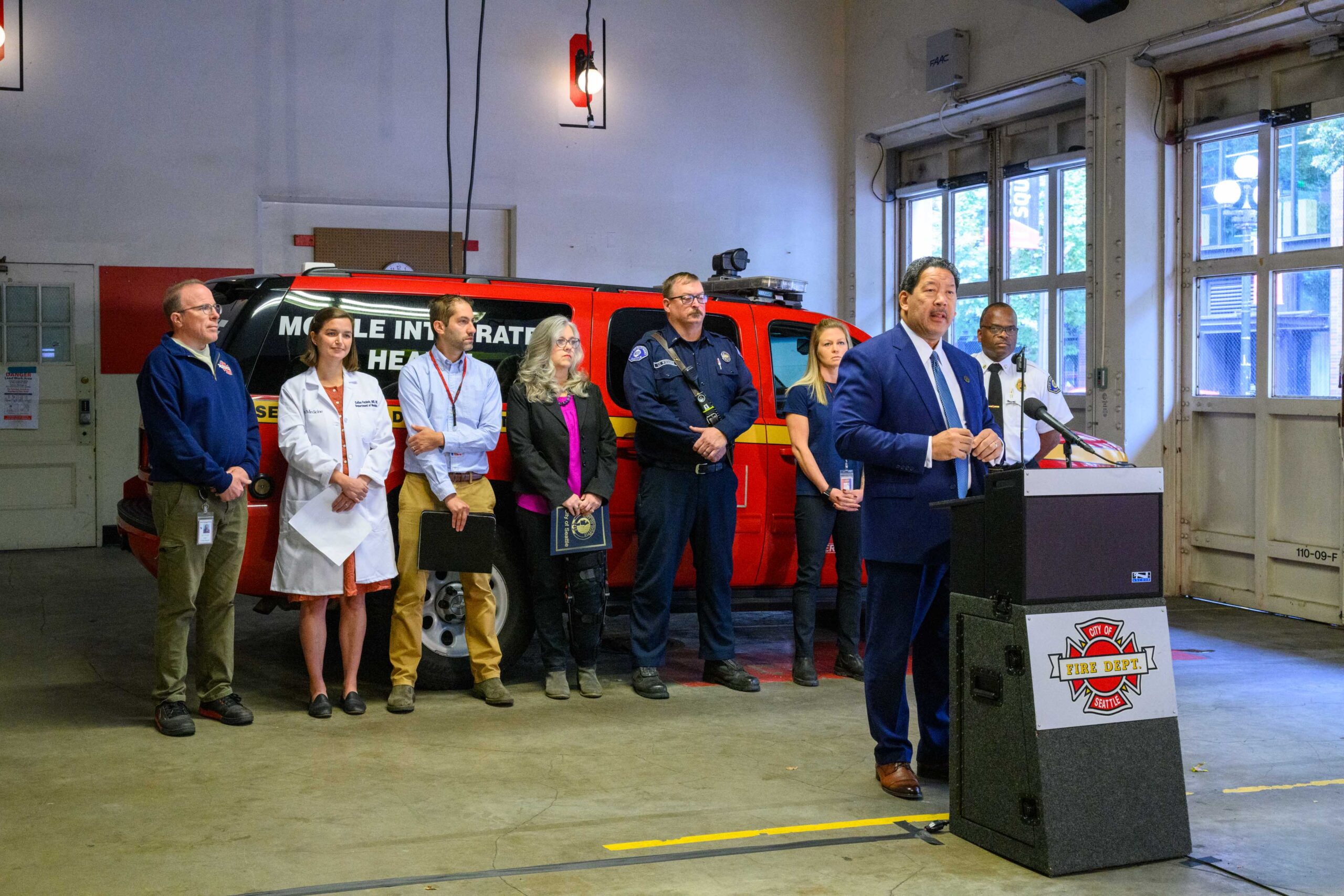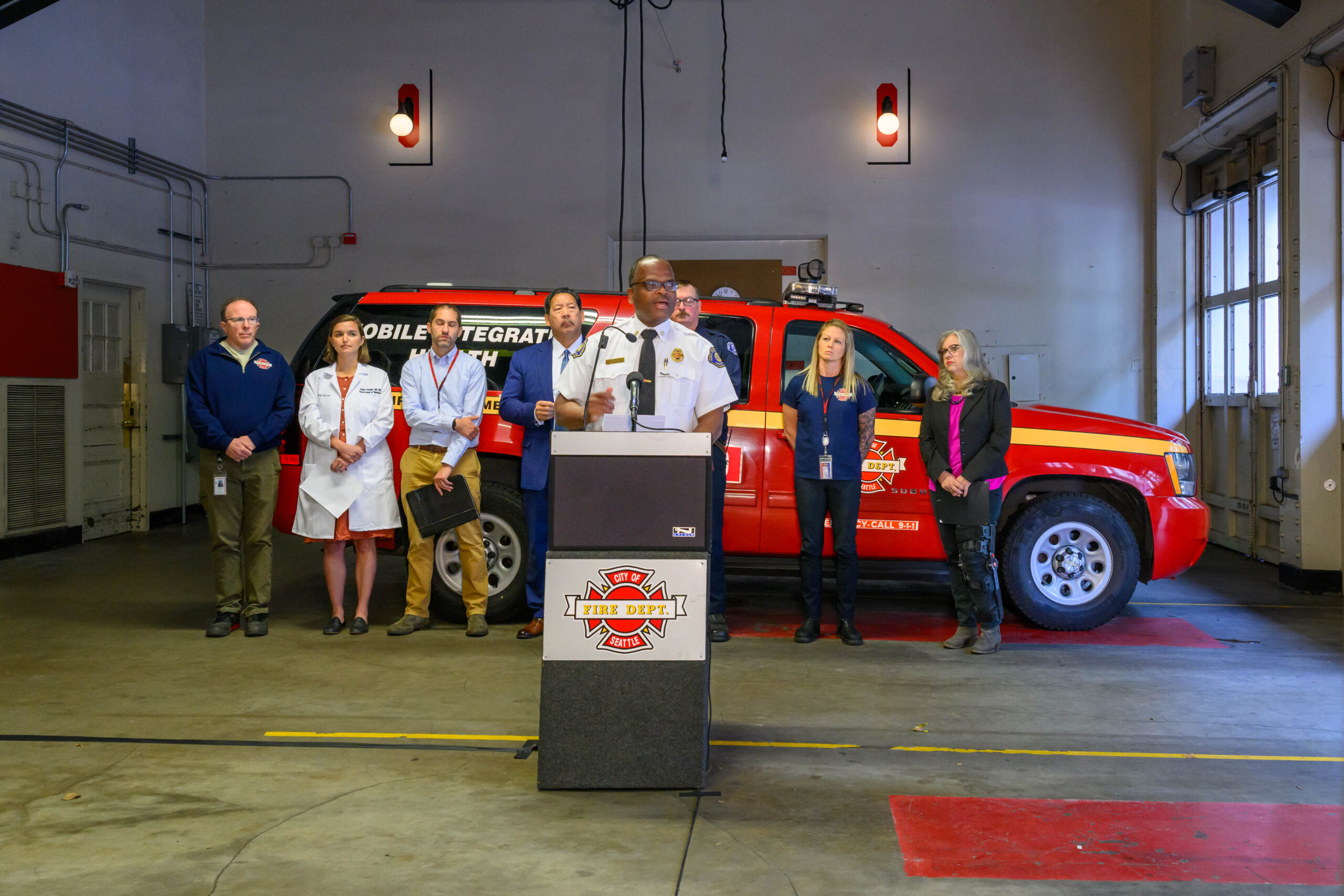
Seattle – Today, Mayor Bruce Harrell joined Councilmember Lisa Herbold, Seattle Fire Department Chief Harold Scoggins, emergency medical responders, and other health leaders to give a progress update on the Health 99 overdose response unit, which began operations in July 2023.
Created following Mayor Harrell’s Executive Order issued in April to address the public health and safety impacts of the opioid and fentanyl crisis, Health 99 is a pilot program in the Seattle Fire Department for dispatching an additional unit to overdose responses to provide follow-up outreach services to individuals experiencing an overdose. The goal of the expansion is to quickly engage overdose survivors to increase acceptance of services and referrals for support.
“We remain committed to a dual public health and public safety approach to the fentanyl and illegal drug crisis that continues to take too many lives in our city – this means being urgent and innovative in how we offer treatment to those suffering from substance use disorder,” said Mayor Harrell. “Health 99 is one component of this bold health-first approach, engaging with overdose survivors to make referrals and handoffs to lifesaving treatment. As we continue to implement actions listed in my Executive Order, Health 99 will play a critical role in creating a supportive system where people experiencing addiction can access the treatment they need to recover and lead healthier lives.”
The post overdose response team is part of the fire department’s Mobile Integrated Health program and responds out of the Health 99 vehicle. Staffed with a firefighter/EMT and a Human Services Department case worker, the team typically operates Monday through Thursday from 9 a.m. to 7 p.m.
Health 99 works directly with a wide array of service providers to connect individuals who have experienced an overdose with outpatient substance use services, primary care, homeless outreach services, and more. Mobile Integrated Health program staff are trained in identifying a client’s existing support system and skilled in helping to connect them with available services.
The pilot program focuses on Pioneer Square, the Chinatown-International District, Belltown, the downtown business district, and Capitol Hill, but the team has discretion to respond elsewhere in the city. Frontline Seattle firefighter/EMTs or paramedics are dispatched initially to overdoses to provide emergency medical care, and Health 99 is added to these responses as available. The role of the Health 99 team begins once the patient is awake and stable.
“Health 99 continues Seattle’s reputation as a national leader in health initiatives to address the opioid crisis, faced by cities across the nation. Follow-up care and warm handoffs to services are essential to reduce the likelihood that an overdose is repeated. Accessible emergency care wrapped in inclusive and supportive services help more people enter addiction recovery,” said Councilmember Lisa Herbold. “Public health and public safety are intertwined issues; the Seattle Fire Department is doing this work to build a healthier, safer Seattle. Last month I successfully championed $1 million in funding to support Treatment in Motion, a mobile medication vehicle at three additional locations, with the capacity to serve up to 360 people each day. Next week I’ll be hearing legislation in my PSHS committee to appropriate $7 million in support of Mayor Harrell’s $27 million investment announced in his April Executive Order, to support an overdose recovery center so Health 99 has a location to take people after non-fatal overdoses to recover, get stabilized on medications, and access resources.”
“Seattle firefighter/EMTs and paramedics are responding to approximately 103 suspected overdose and related emergency calls per week throughout the City. We immediately provide emergency medical services once personnel arrive on scene to help save the lives of those who overdose. With the new post overdose response unit, we can now expand our impact by connecting or reestablishing patients with services to get them on the right path for addiction treatment,” said Fire Chief Harold Scoggins.
Since the official launch of the pilot program on July 7, 2023, the Health 99 unit has responded to 68 overdoses and conducted 20 client outreach visits. From the combined overdose responses and follow-up visits, a total of 52 individuals have received services from the team. Seventy-seven percent of clients served by Health 99 have been male and the majority are also experiencing homelessness, in addition to battling addiction. The team averages three to five responses per 10-hour shift.
The Health 99 unit is equipped with a full set of emergency medical supplies, fentanyl test strips, and Narcan kits for utilization on responses. The unit also carries a variety of specialty supplies to include clothing, food, water and mobile phones for clients. To date, approximately 50 doses of Narcan have been distributed in overdose supply kits to clients of the program and other individuals.
“The overlapping opioid, mental health and homelessness crises are huge, and many systems will need to align to make forward progress. We think the fire department is well positioned to be part of a holistic approach, meeting clients wherever they are at in the community,” said Mobile Integrated Health program manager Jon Ehrenfeld.
“In the emergency room at Harborview, we see firsthand the skyrocketing number of overdoses as the opioid crisis ravages our City. Establishing the post overdose response team is an incredibly important step to bring evidence-based interventions into the field where they can save lives. This team will provide a strong foundation to build on as we continue to reimagine our community’s overdose response, providing people effective and compassionate care at the moment of crisis,” said Emergency and Addiction Medicine Physician Dr. Callan Fockele.
In July, Mayor Harrell announced a $27 million investment toward innovative facilities and treatment programs to reduce the harmful impacts of fentanyl and other illegal drugs on Seattle communities through a health-first approach, supporting efforts from his Executive Order.
In addition to the post overdose response unit, the City is taking steps to begin an innovative contingency management program with Plymouth Housing in October and new program plans are advancing for a post-overdose diversion facility, increased mobile opioid medication delivery, and expanded naloxone in the city’s highest overdose locations.
